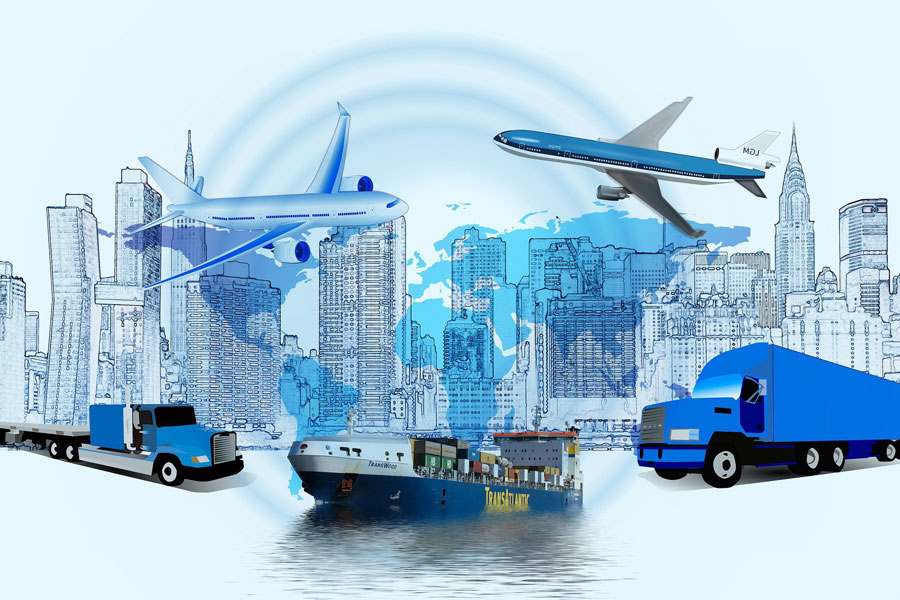Nowadays, online retailers are replacing traditional stores for various perspectives, as eCommerce is turning into the favoured shopping method among purchasers. And as per the recent web development stat, about 1.9 billion individuals globally bought a product online in 2019.
In recent years, eCommerce attainment has expanded altogether, prompting competition, challenges and consistent changes.
As this strategy for shopping grows in popularity, it carries with it another cluster of eCommerce logistics challenges, for example, quicker delivery times, free and simple returns, real-time tracking, and mobile-optimised sites.
Effectively exploring these difficulties in online eCommerce business and thinking of techniques to conquer them is critical to stay competitive in the market.
Through this piece of article, I will describe how you can overcome the challenges of eCommerce logistics. So, without wasting any more time, let’s start!
What are the Challenges to Overcome in eCommerce Logistics?
In order to beat the challenges of ecommerce logistics, there are hand-picked ways for each as well as some lessons. Now, take a quick look at the significant challenges:
Challenge #1: Lack of Verification Measures
Challenge #2: Product Returns and Refunds
Challenge #3: Lack of Integration
Challenge #4: Customer Issues Going Unnoticed
Challenge #5: Customer Loyalty
Here are the different ways to overcome these challenges
1. Focus on Your Core Competencies
If your organisation isn’t centred about logistics, at that point, you do not have to invest energy and give your teammates to that aspect where those resources can be better assigned inside your organisation.
Do what you excel at, and let another person spend significant time in getting your items to your users.
Is logistics your core competency? Is it essential to your plan of action? If not, outsourcing can mean a ton. In the past few years, eCommerce logistics has become significantly more perplexing.
They are serving new geographies, new nations. Furthermore, keeping on top of this as a retailer can be amazingly troublesome. So retailers must have an honest discourse about when logistics are indeed meddling with the accomplishment of their business.
In case you’re stressing more over the issues in a warehouse, than how you could possibly be pleasing your consumers or selling more items, it might be the time to think about outsourcing. You may hire developers in India and can save a lot on your outsourcing cost.
2. Synchronise Your Inventory Effectively
It’s straightforward; however, that doesn’t mean it’s simple – precisely surveying and estimating your inventory is staggeringly troublesome. Focusing on restocking things and not having a lot of abundances is a challenge that requires consideration.
Inventory management is outstandingly significant, and it’s also, to be honest, a science. How much buffer to have, and the amount you need to have available, truly changes depending on the retailer’s circumstance, what they sell and where they get themselves monetarily.
Abundance stock is awful, correct? It ties up money that you could utilize more beneficially in different regions of your business.
Yet, on the other side, we’ve all been in circumstances where we’ve been shopping online, you discover what you want to purchase, yet tragically, there are no units available.
That is a terrible customer experience that is a consequence of possibly not having the appropriate controls on your inventory. The objective should be the right stock, at the right place, and the right amount.
Moreover, doing that is much harder than it sounds. If you go online, there’s a great deal of data about how to assess how much inventory to hold, to figure and dissect your stock turn rates, your turnover days, etc.
3. Ecommerce Supply Chain Challenges

eCommerce has influenced supply chain management amazingly. With the business changing at a fast pace, users have significantly more power in the purchasing cycle.
Numerous organisations sell comparable items, permitting customers to hop between companies to locate the best cost and delivery time.
To remain significant, your supply chain must meet to live up to your clients’ requirements and desires and rotate rapidly as the market changes. Primary eCommerce supply chain challenges incorporate inventory administration and delivery costs.
If one of your items is unavailable, a customer is significantly more prone to purchase a comparable item from a competitor instead of waiting for your product to be back in stock.
“Transportation speed is likewise a big affecting component for your consumers.”
Individuals are reluctant to sit tight for longer shipping when they realize a comparable thing can be bought from Amazon, where they can harvest the quick and “free” transporting advantages of Amazon Prime.
However, studies show that a larger part of consumers is eager to move to different retailers that offer a similar delivery speed and cost as Amazon.
4. Ensure Quality and Order Accuracy
Walk before you run, and don’t make straightforward, avoidable, mistakes. Start solid, conveying the right requests on schedule. It’s the best thing you can accomplish for your business.
I would recommend you to start with the basics. Quality and order accuracy and getting orders out of a contentment place on time is the absolute most significant capability that you have to see when you’re conversing with potential merchants.
Nothing baffles the purchaser more than screwing up the basics. Individuals are moulded now to anticipate a significant level of accuracy and quality.
“No measure of wow factor, no amount of marketing buzz will actually conquer this and it should be the main conversation point with the merchant.”
5. Free Shipping, Fast Shipping

Offering no-cost shipping can urge individuals to push ahead with their shopping. Regardless of whether there’s a restricted promotional offer or a minimum order size, these methods will help get orders through the checkout.
Free delivery is totally significant. A lot of proof reveals to us that not offering some kind of free shipping is one of the main reasons why shopping carts get abandoned.
Moreover, there are approaches to deal with the expense of free transportation, for example, having a base request size to meet all requirements for it, offering it only with promotions, or with select products, etc.
With the free transportation option, ensure you have an eCommerce logistic solution that is reasonable.
Gone is the “10-business-day delivery.” Consumers anticipate delivery of their products in a timely fashion and get disappointed when it is not an alternative. So, you must ensure a sound, responsive, delivery time to bring the customer back.
6. Leverage Technology for Logistics Rates

Various rates for various shipments can offer significant savings; however, it requires technological innovation, data, and abilities to make the best transportation choices.
There’s a tremendous opportunity in the market to work with niche carriers, regardless of whether they’re territorial suppliers or big eCommerce organisations.
organisations like DHL that truly represent considerable authority in the lighter weight parcels, to get genuinely significant savings and to sort out approaches to do a few days cross country in a significantly more affordable manner.
But, to benefit from these numerous carriers, you need specific capacities, and the main one is rate service shopping. You need the technology either in your WMS, or transportation management system. It would help if you settled on the ideal delivery choice, giving the details of the request.
What’s the origin zip, where is it going, what amount does the package gauge? What carriers can execute that?
Then, rate shopping over those carriers to attempt to do that in the most reasonable style. Shopping around and focusing can spare a ton of problems and consider affordable, brisk delivery.
7. Regionalise Inventory to Reduce Cost
Most of the enormous shipping organisations that span the country offer one-size-fits-all answers for shipping, yet they aren’t generally the most straightforward and are rarely the least expensive.
Some of the more prominent brands and the more significant retailers are currently trying different things with same-day delivery. The responses to that paradox genuinely exist in the supply chain.
Final Words
eCommerce logistics can be complex, yet it tends to be tackled efficiently. I hope by now you have got the idea about how to overcome the challenges of eCommerce logistics.
In case, you are still confused or stuck in between then you must contact a web development company in India. They will make sure that you’ve made a smooth, incredible customer experience before trying to move forward with anything else.
Good Luck!!






Leave A Comment